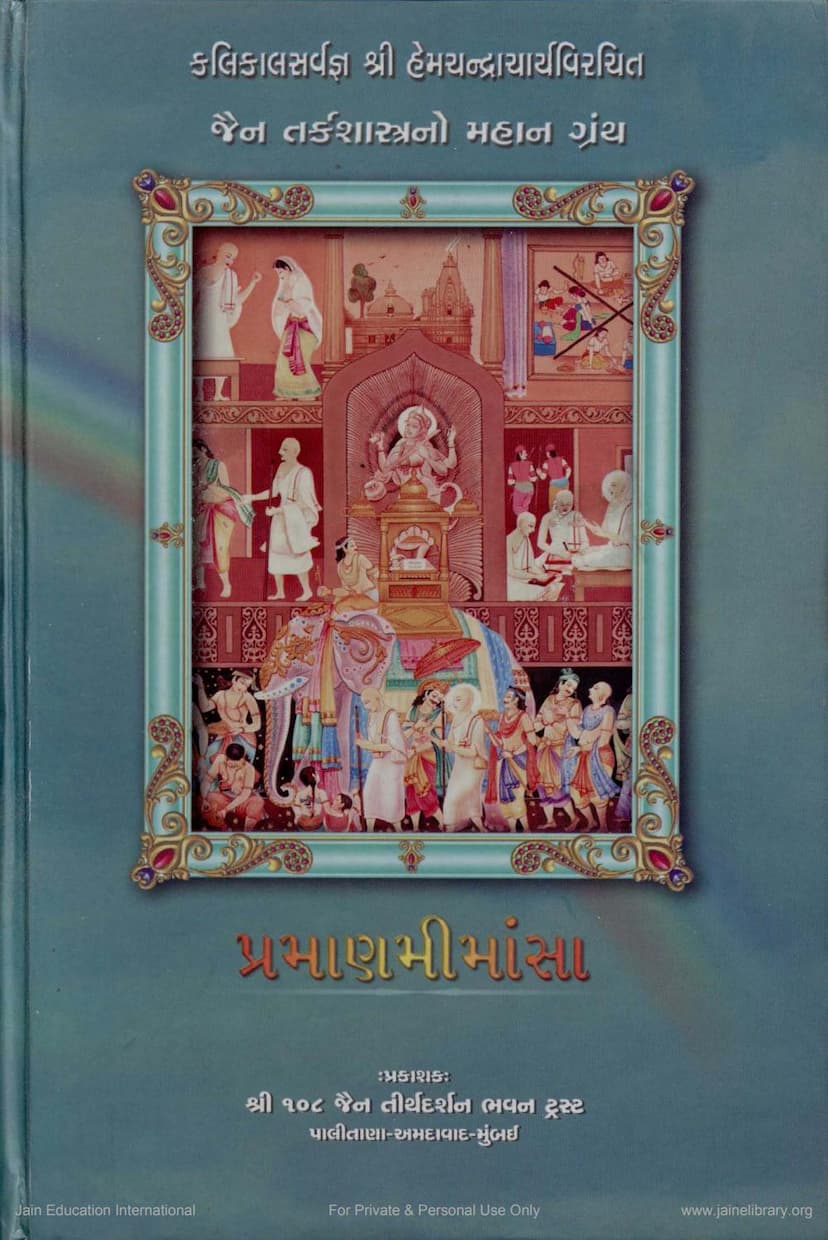Pramanmimansa Jain History Series 10
Added to library: September 2, 2025

Summary
This Jain text, Pramanmimansa, authored by Hemchandracharya and translated/edited by Nagin J Shah and Ramniklal M Shah, published by 108 Jain Tirth Darshan Bhavan Trust, is a significant work in Jain logic and epistemology.
Here's a comprehensive summary of the provided text, focusing on its key aspects:
Core Subject and Purpose:
The text is a major treatise on Jain logic and epistemology, specifically focusing on the concept of Pramanas (means of valid knowledge). It aims to elucidate the Jain perspective on how we acquire valid knowledge, the nature of knowledge itself, and its sources.
Author and Legacy:
Hemchandracharya, a renowned Jain scholar of the 12th century, is the original author. He is revered as "Kalikal Sarvagya" (OmniscBient of the Present Age) for his vast contributions across various fields, including grammar, poetry, history, and philosophy. His influence on the culture and intellectual landscape of Gujarat, particularly during the reign of kings Siddharaja and Kumarpala, is highlighted.
Content and Structure:
The book is a translation and elaboration of Hemchandracharya's original Sanskrit work, Praman Mimamsa, including his commentary (Svopagya Vritti). It also incorporates a detailed Hindi preface and philosophical commentary by Pandit Sukhlalji, which has been translated into Gujarati.
The Praman Mimamsa itself is structured into chapters and sub-sections (Aahnikas) that systematically cover the core principles of Jain epistemology. The provided text gives a glimpse into the first chapter, which delves into:
- The Nature of Jain Philosophy: Contrasting it with realist and non-realist philosophies, and emphasizing its unique Anekantavada (many-sidedness) perspective.
- The Immutability of Jain Perspective: Discussing how Jainism's core view of reality has remained consistent throughout history.
- The Scope of Knowledge-Acquisition Capabilities: Examining different theories regarding the extent and limitations of sensory and other means of knowledge.
- The Extension of the Realm of Knowables: Discussing the nature of knowable entities.
- The Analysis of Indian Logical Traditions: The introduction places Jain logic within the broader context of Indian philosophical schools like Nyaya-Vaisheshika, Mimamsa, Buddhism, and Jainism, highlighting the contributions of key logicians from each tradition.
- Pramanas (Means of Valid Knowledge): The text elaborates on various means of knowledge according to Jainism, including:
- Pratyaksha (Direct Perception): Hemchandracharya's definition of Pratyaksha, distinguishing between main Pratyaksha (like Kevala Jnana - Omniscience) and empirical Pratyaksha, and discussing its nature, sense organs, and the process of sensory perception (Avagraha, Iha, Avaya, Dharana).
- Paroksha (Indirect Knowledge): This section discusses various forms of indirect knowledge, including Smriti (Memory), Pratyabhijna (Recognition), Uhah (Reasoning/Tarka), Anumana (Inference), and Agama (Scriptural Testimony).
- Critique of Other Philosophical Views: A significant portion of the text involves the critical analysis and refutation of opposing views from other Indian philosophical schools regarding the nature of knowledge, reality, and the means of knowledge. This includes engaging with theories from Nyaya, Mimamsa, and Buddhism.
- Key Jain Concepts: The text delves into crucial Jain philosophical concepts like Anekantavada, Nayavada (theory of viewpoints), and Saptabhangi (the theory of sevenfold predication) as they relate to epistemology and logic.
- Hemchandracharya's Contribution: The book emphasizes Hemchandracharya's specific contribution to Jain logic by presenting a comprehensive and balanced text that synthesizes and clarifies previous knowledge, making it accessible to a wider audience. The text highlights his balanced approach, avoiding extremes and presenting a coherent framework for understanding knowledge.
Translation and Editorial Aspects:
The publication is notable for providing the original Sanskrit text along with its Gujarati translation. The inclusion of Pandit Sukhlalji's extensive Hindi introduction and his philosophical Hindi commentaries, translated into Gujarati, makes the complex philosophical concepts accessible to a broader readership, especially those familiar with Gujarati.
Significance:
Praman Mimamsa is considered a cornerstone of Jain epistemology. It demonstrates the depth and sophistication of Jain logical reasoning and its significant contribution to the broader field of Indian philosophy. The book serves as an invaluable resource for scholars, students, and anyone interested in understanding the Jain approach to knowledge and reality.
Overall, the book Praman Mimamsa is a scholarly and comprehensive work that offers profound insights into Jain logic and epistemology, presenting the foundational principles of this rich philosophical tradition through the lens of Hemchandracharya's magnum opus, made accessible through meticulous translation and scholarly commentary.